The media literacy game
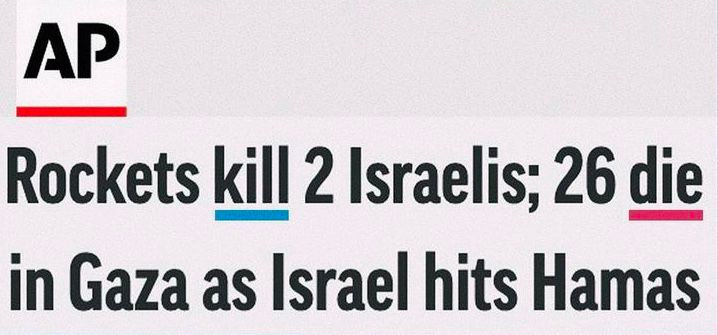
There's a game that my children do not like, but I insist we play it.
We have talked before about manufacturing consent for genocide in our media - this post is an extension of that.
So, let's play.
First of all, open the front page of Stuff or any mainstream media page of your choice.
Today, 14 October, the news will be dominated by the hostages released from Israel and Gaza. Now you might be thinking - hold on, what hostages were released in Israel?
Well, let's talk about the hostages taken by Israel, because you likely won't read about them.
Nearly 2,000 Palestinians, including about 1,700 seized and disappeared from their homes and businesses in Gaza and held without charge, were set free from Israeli jails at the same time as Israeli hostages held in Gaza were released.
These people are called prisoners because they're Palestinian. When Israel kidnaps children, they're not hostages; they're prisoners.
Only 88 of the 'prisoners' released by Israel today were actually prisoners. The rest were men, women and children who had never been charged with anything. Yes, children.
Before this release, 11,056 Palestinians were held in Israeli prisons. At least 3,500 of those were held without trial. An Israeli military database has indicated that only a quarter of those detained in Gaza were classified as fighters. And that's Israel's definition of a fighter, which is as vague as "Palestinian boy or man over 10 years old".
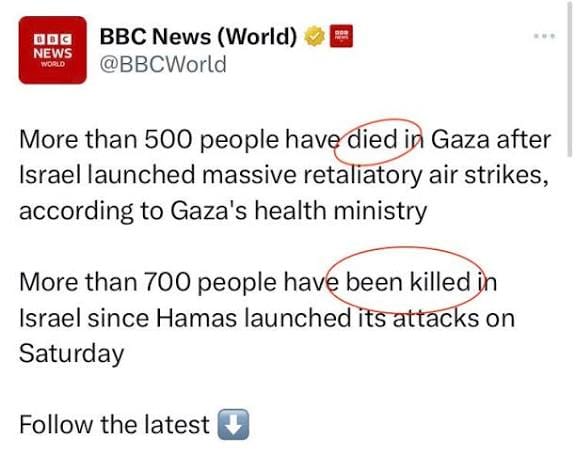
So, let's talk about language.
Prisoner of War (POW): According to the Red Cross, Prisoners of war (PoWs) are members of the armed forces who have fallen into enemy hands in international armed conflicts.
Hostage: According to good old Merriem Webster, a hostage is a person held by one party in a conflict as a pledge pending the fulfilment of an agreement.
Prisoner: According to every definition I could find, a prisoner is a person legally committed to prison as a punishment for a crime or while awaiting trial.
The keyword there is legally.
Detainee: According to Merriam-Webster, a person held in custody, especially for political reasons.
When it comes to prisoner of war status, no media outlet has printed how many hostages taken by Hamas were in the Israeli Occupation Forces.
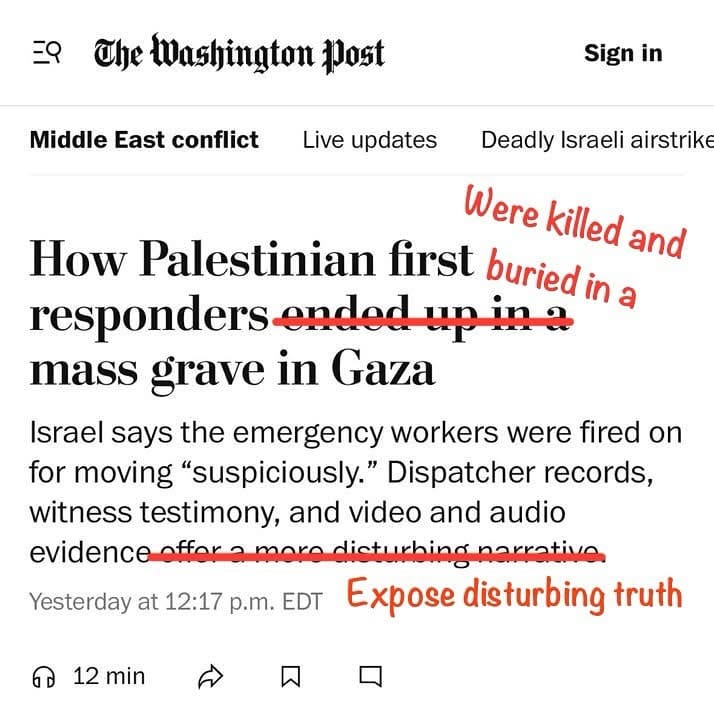
Look at the stories being published today.
Read the different ways Palestinians are talked about in the media compared to how Israelis are. Palestinians are always referred to as "Hamas"; Israelis are never referred to as "occupiers", which is their legal definition.
Israelis have "children", Palestinians have "young adults", "minors" or "under-18-year-olds".
Today, “family and friends” will be welcoming Israelis and “people” will be welcoming Palestinians. Because to the media, Palestinians don’t have family, friends and loved ones - they have “crowds”.

It’s the language of dehumanisation.
For example, 1000 people in a square in Tel Aviv are the “family”, “loved ones”, or “friends” of Israeli hostages. In Gaza, 1000 people waiting for Palestinian hostages are “crowds”, “chaotic, “hordes, “people”; they will not be described as loved ones, family or friends.
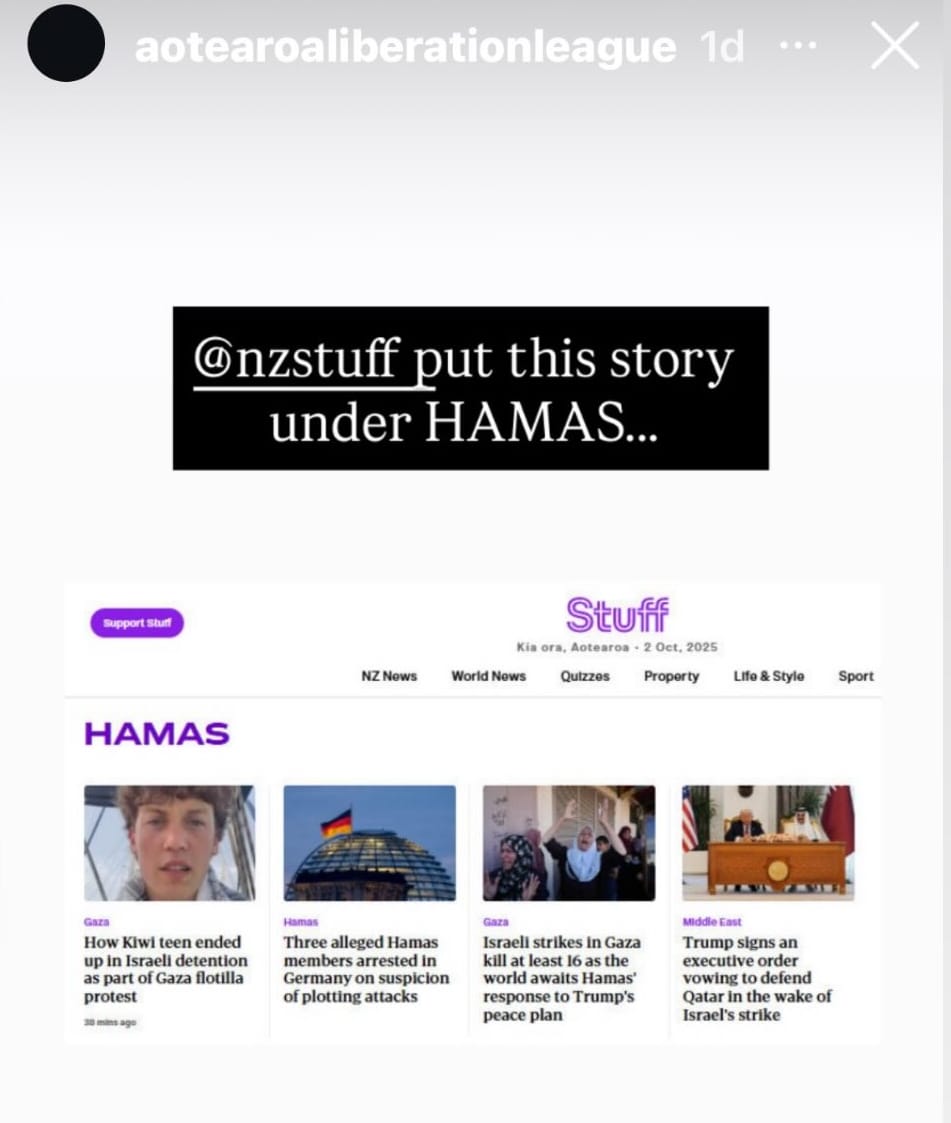
How do the words used differ? Put them into three columns: Positive, Negative, Neutral.
Where do these words fit? And who do they describe?
"Terrorists" - undoubtedly a negative term. And only ever used for Arab or Muslim people.
"War" - negative obviously, but nearly neutral when compared with "genocide". "Conflict" is downright positive compared to "war". What about "clashes"?
What about "famine" when compared with "man-made famine"?
What about "militant" and "soldier"?
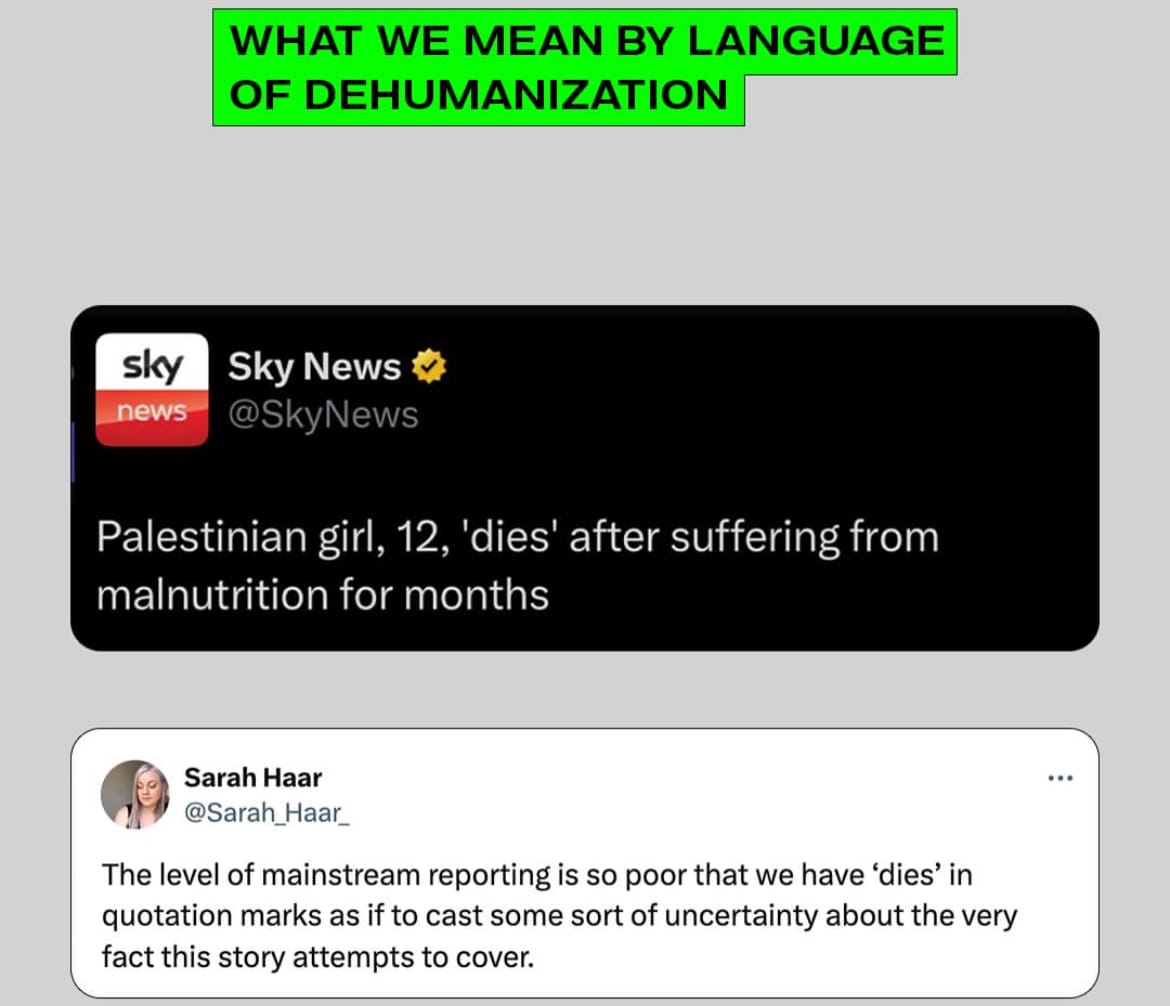
What terms are used, and what terms are never used?
What about the refusal to use the term "Gazans"? Because that would mean Gaza belongs to the people, and the people it belongs to are Palestinian. "Hamas" is used interchangeably with "Palestinians", so the Gaza Strip is called "the Hamas-controlled Gaza Strip".
How often do you see "Muslim" or "Islam" compared to "Zionist"? How often do you see the "Palestine" compared with "Hamas"?
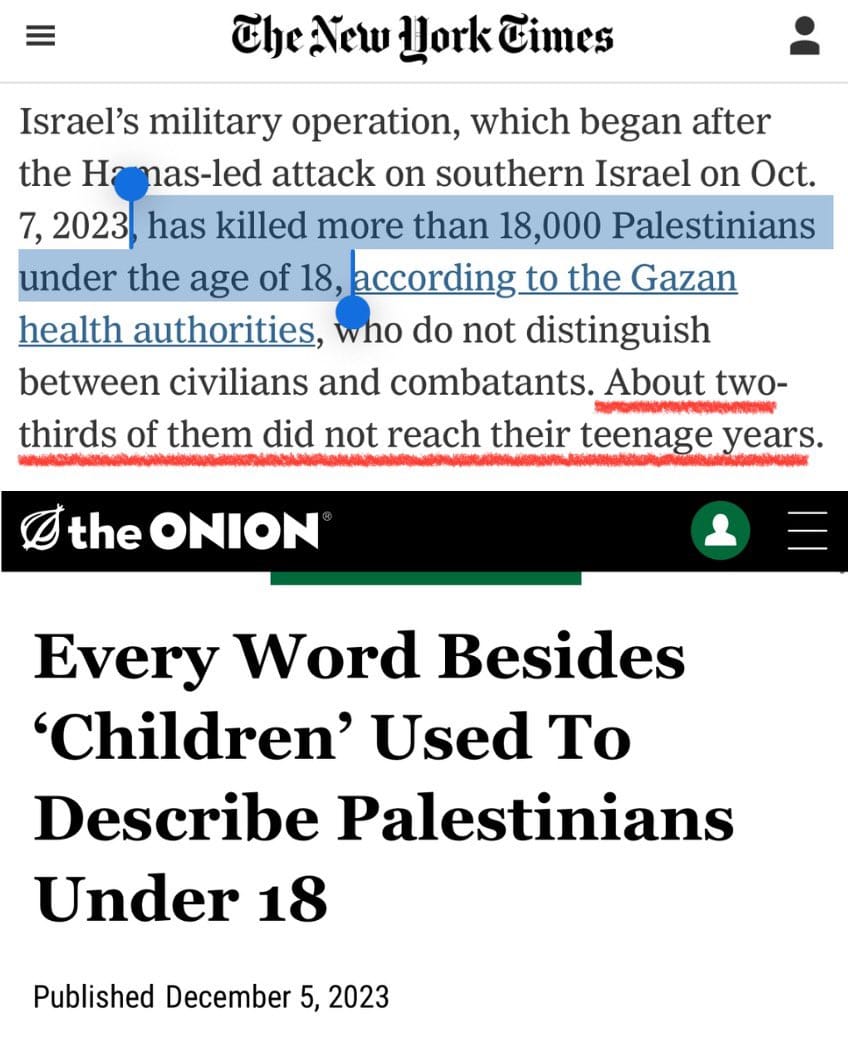
The Middle East Eye (when writing about the terms used in media) says that in Israeli media, "all Palestinians living between the River Jordan and the Mediterranean" are referred to as "Arabs". This is to imply "the falseness of Palestinian identity and the temporality of their connection to the land". How often do you see the term "Arab" over Palestinian - and did you know the origins of that term and why it's used (I didn't!).
What is represented as potentially false information, and what isn't?
The death toll is attributed to the "Hamas-backed Health Authority", but Israel's death toll is never qualified. Israel can count its dead easily (466 people). But since October 2024, the Palestinian Health Authority's death toll has only encompassed identified bodies. And only those with gunshot wounds and blast injuries. So, would you not include that in stories when using the '67,000' number? The 460 malnutrition-related deaths recorded amid the man-made famine in North Gaza are not included. The bodies under the rubble are not included. Bodies that didn't make it to a hospital are not included.
Ask yourself, when have you ever seen a qualifier about the death toll being an undercount?
Hamas uses "human shields" - but Israel mandates that as soon as their children turn 18, they must serve at least two years in the occupation forces killing Palestinian children.
Israelis are "killed". Palestinians "die". Israel is "attacked" and they "defend". Palestine has "explosions" and they "attack".
We saw this during the Holocaust. In the essay, The Grammar of Propaganda: How Language Builds Tyranny, this is outlined:
In official Nazi documents, the language used to describe the persecution of Jews was chillingly bureaucratic and passive. Phrases like “the Jewish question was dealt with” or “measures were taken” obscure the brutal reality of individuals making decisions to systematically murder millions of people. The violence becomes an impersonal, administrative procedure, scrubbed clean of moral responsibility.
But the essay also rightly points out that "understanding the grammar of propaganda is a form of self-defence".
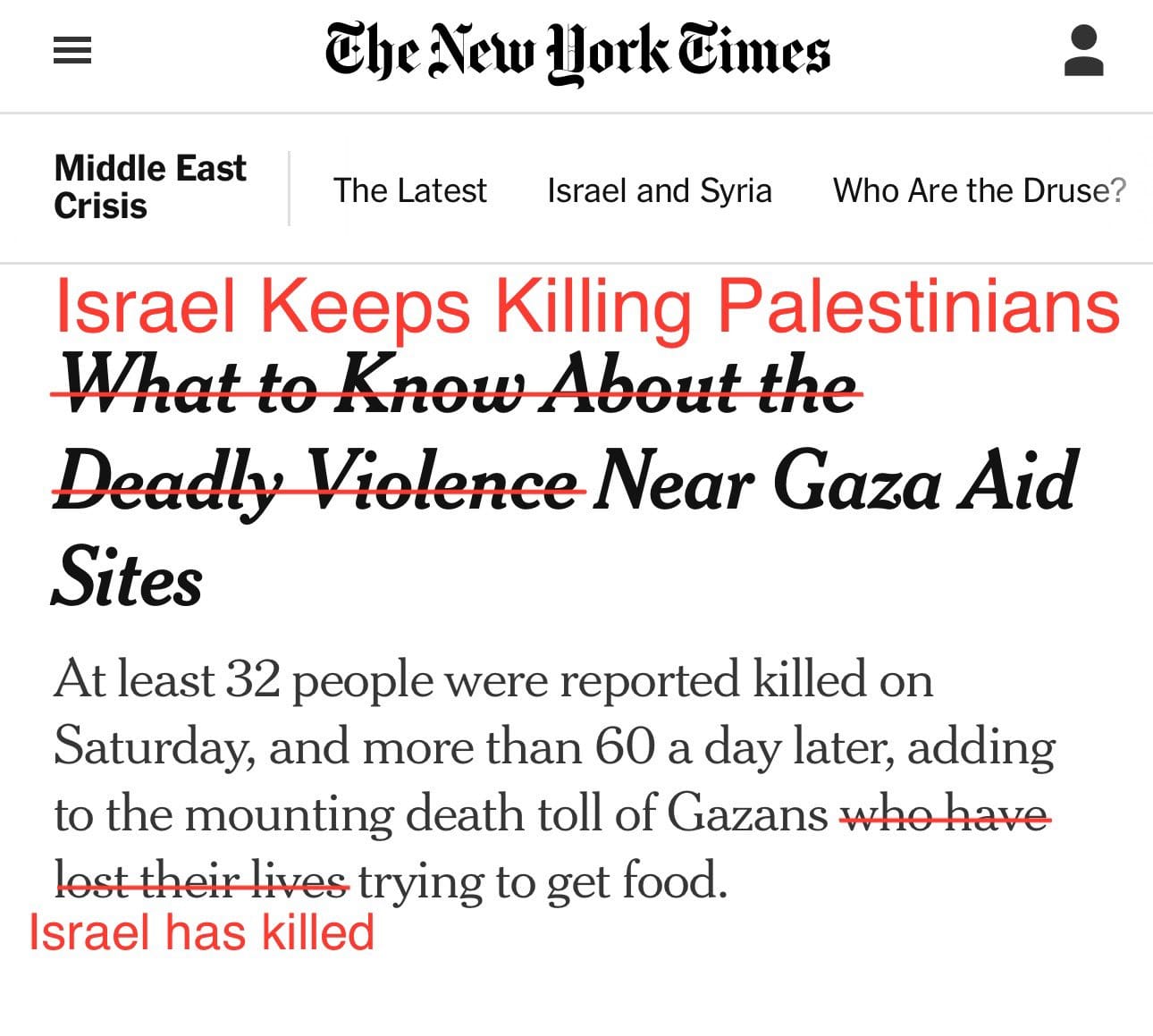
Questions to ask yourself when reading or watching mainstream news
I've used the genocide for my examples above, but this relates to all news.
- Who is the source for this story? Is it the government? Does it read like a PR statement? Cut and paste statements from the article and chuck them in a search engine. Did the journalist publish a press statement without fact-checking?
- What does the source of the story want you to know or believe? Do they want you to buy a product? Support a government policy?
- Who has been asked for comment? Google them. What other stories have they commented on? What lobby groups do they belong to? If they claim to represent an entire group of people, do they? If you wouldn't consider Brian Tamaki a spokesperson for all Christians, would you consider an extremist Zionist the voice of all Jewish people?
- Who paid for this? Sometimes you might be surprised that what you're reading is paid content. It often isn't clear.
- Is this fact or opinion?
- How does it make me feel? Was this piece designed to make me feel a certain way?
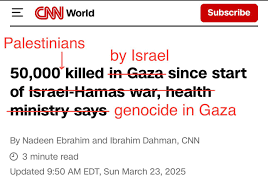
In the absence of media literacy classes for all ages, it's up to us to try to educate ourselves and share that with others.
We can only hold media organisations accountable if we can see and provide evidence of what they are doing. We can only challenge propaganda if we can recognise it as propaganda.
As we see human rights abuses and war crimes around the world, we must recognise that the pen isn't just mightier than the sword, it is the sword.
Share my stuff to your social network of choice!
Sharing my work helps me out more than anything (except for a paid subscription.) Just click/tap any of the buttons below and you can share the post to whatever social media site you like.

